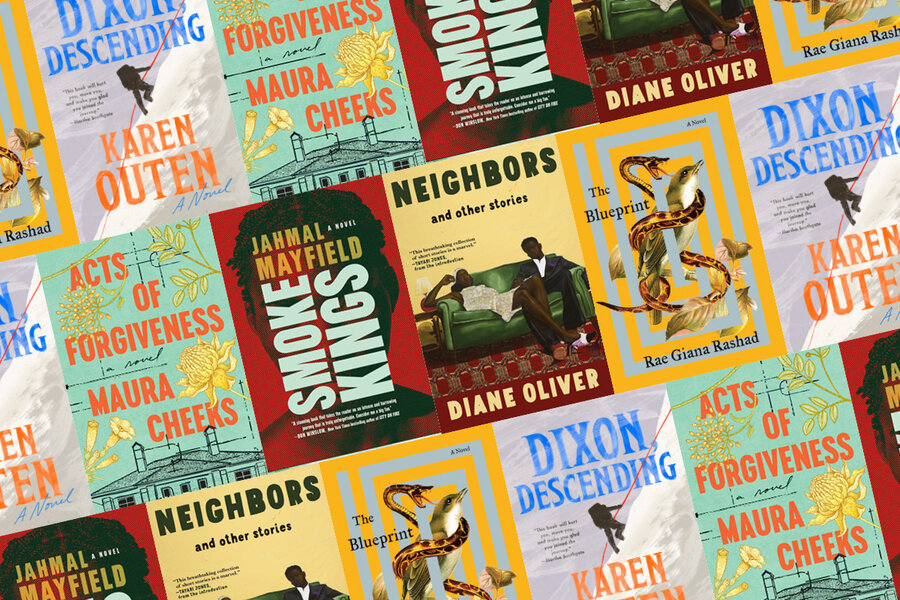Five novels by Black writers pulse with powerful storytelling
Loading...
Great books can change lives; they have changed mine. My favorite authors include writers of every hue, but what baffles me is that the work of Black writers seems to get highlighted only during Black History Month. Great prose is for every reader, and the celebration of it should not be limited to the month of February.
As a Black writer, I also feel a duty to highlight the work of other Black writers that I think would otherwise be ignored. Here are five fiction debuts that are worth reading during Black History Month – and in any other month.
When present mirrors the past
Why We Wrote This
The novels of Black writers don’t often receive the attention they deserve, except during Black History Month. This February brings five debut novels worth reading – now or any month.
In Rae Giana Rashad’s “The Blueprint,” the year is 2030, years after the United States has been defeated by a powerful group called The Order.
Under The Order, women have no voice. Black women are reduced to having their lives determined by an algorithm, which determines whom they will marry. But before they marry, as early as age 15, they are farmed out to white men to breed with.
Rashad’s protagonist, Solenne Bonet, is the descendant of an enslaved concubine, Henriette, who lived more than two centuries earlier. Solenne’s life mirrors that of her ancestor when she is essentially held in bondage by a powerful and wealthy white man, Bastien Martin.
As Solenne starts to write Henriette’s story, Bastien, a scion of Thomas Jefferson, begins a very controlling relationship with her. Her first kiss, first sexual encounter, and first moments of intimacy happen with Bastien. She hates her situation, which reflects that of Henriette. Like her ancestor, she tastes a small slice of freedom, only to have it snatched away.
At times, the path Solenne should take seems clear, but Rashad does a masterful job of making her a flawed human who can’t get out of her own way. As in Henriette’s story, the groundwork for a better future is laid down at the end.
Filled with themes such as regret, rebellion, tyranny, and courage, “The Blueprint” is a compelling read.
Twisted altruism, vigilante justice
If first novels indicate career trajectory, Jahmal Mayfield has a future in crime fiction. His “Smoke Kings” is a fresh take on current events and history, mixed with social commentary.
Mayfield’s story revolves around a vigilante group called the Smoke Kings. It targets the offspring of racist, mostly white men, who committed heinous acts against people of color decades earlier. The Smoke Kings deludes itself into thinking that it has historic, altruistic reasons for exacting justice, but the group’s beginnings are rooted in a more recent event. One of its own was killed by a white gang, a murder that has gone unpunished.
There is always one weak link in a crew or one person who thinks that he or she is smarter than the group. “Smoke Kings” doesn’t depart from this track in building up hostility between two main characters, Isiah, a Korean man and the only member of the group who is not Black, and Nate, a militant Black man who can’t admit his prejudice. They travel the country trying to right wrongs, but two of their jobs bring them to the attention of a conscientious, bigoted former cop and a hate-filled white militia man. Isiah and Nate are caught and have to escape rogue justice before they get killed.
“Smoke Kings” is a fast-paced story of twisted altruism that is not only entertaining but also thought-provoking.
Facing hate and racism
The best way for me to appreciate “Neighbors and Other Stories” was to imagine myself as a journalist writing about integration, civil rights, and Jim Crow. That is how I got the full scope of the brilliance of Diane Oliver’s work. Oliver, a short story writer, died at age 22 in 1966, leaving a nearly forgotten trove of work behind. Only four of her stories were published during her short life.
The first story in the collection, “Neighbors,” imagines a Southern Black family that is consumed by fear and anxiety. The school-age son, Tommy, will be the first Black student to enroll at Jefferson Davis School after Brown v. Board of Education, the U.S. Supreme Court decision that ruled it unconstitutional to separate children in public schools on the basis of race. Think of Ruby Bridges, the first Black student to integrate an elementary school in the South, and ponder what it must have been like for a family faced with that task. How did they sleep? Did they sleep? Why go through with integration under the constant threat of violence?
Nerves are frayed. Tommy is afraid he will be harmed. His parents have received threats against his and their lives. The night before school, the home is vandalized and a front window is shattered. On the first day, his parents teeter between not wanting to run the risk and having to decide if what’s best for Black people should come before their family.
While Oliver’s stories are fiction, the subject matter, such as interracial marriage and the poor treatment of Black domestic workers, rings true. “Neighbors and Other Stories” offers an amalgamation of tales – some harrowing – told by a writer who knew all too well what it meant to be racialized. Oliver’s insights give the powerful storytelling that much more punch.
If reparations became law
A line of desperate, hopeful, and excited Black people wraps around a Mississippi library. They have come from all over the United States to uncover their families’ histories. If they can prove their ancestors were enslaved, they would be eligible for reparations money. At the same time, a mob of angry white people snarls, yells obscenities, and hurls glass bottles at them.
In “Acts of Forgiveness,” Maura Cheeks imagines what the U.S. would look like if the government passed a law requiring reparations.
Willie Revel is the protagonist, the youngest and only daughter of Max and Lourdes Revel, an upper-middle-class Black family in Philadelphia. Willie has ambition and career prospects as a journalist. One job offer has come from a college professor, Elizabeth Johnson, who is starting a political career that will make her president.
Max, who once shunned Willie as heir to his construction business, has health issues that prevent him from running the company and begs her to trade in her career to come home and help him. Then President Johnson gets the Forgiveness Act passed, which will give the progeny of formerly enslaved people $175,000 per person if they can prove their ancestry.
This starts a national dash to the South to unearth official records, and it brings out the worst in many who oppose it. The Revel family is torn between desperately needing the money to save its business, and wondering if the hassle is worth it. And not everyone is convinced the government will keep its promise.
This book starts out slowly, but gets better with each page. Cheeks, daughter of former NBA player Maurice Cheeks, starts with an intriguing premise and weaves it into a fascinating story. “Acts of Forgiveness” is a thoughtful tale that coaxes readers to ponder what would happen if a reparations law were ever passed.
Ambition atop Everest
In Karen Outen’s novel, “Dixon, Descending,” two intrepid brothers decide to conquer Mount Everest together.
The first brother, Dixon, is a former Olympic hopeful in track and field who missed making the team by the narrowest of margins. Nate is the older brother who was always seen to be a risk-taker.
As the two begin their climb, Nate’s status as the risk-taker crumbles. That causes a slow burning resentment in Dixon, but not enough to keep them from ascending. After all, the brothers trained for a year and have spent tens of thousands of dollars.
Nate can’t make it to the top, but Dixon does, and when tragedy happens during his descent, Dixon starts to unravel. He may have been the first Black American to climb the highest mountain in the world, but was the cost too high?
After the Everest trip, Dixon “descends” in other areas of his life: as a school psychologist and as a family man. Grief, guilt, and the brittle fact that despite the worst happening, life keeps moving forward, lead Dixon to a reckoning with sorrow and guilt.
“Dixon, Descending,” with its poignant passages, is ultimately a heart-wrenching story of great loss.







